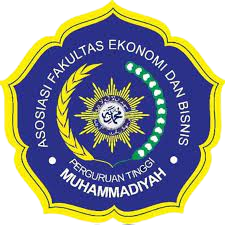The Effects of Various Internal and External Factors on the Movement of the Indonesian Sharia Stock Index on the Indonesia Stock Exchange
DOI:
https://doi.org/10.24269/ekuilibrium.v19i2.2024.pp202-212Abstract
This study analyzed several factors that affect the Indonesian Sharia Stock Index. The use of the inflation-currency rate, the availability of money, and the BI rate were all internal factors considered in this study. Meanwhile, the external factors used in this study were international gold and oil prices. The Engle-Granger Error Correction Model was used to analyze time series data in this study. The research used the monthly period started from May 2013 until January 2022. The long-term results of the research variables that could influence the exchange rate, total money supply, world oil prices, and world gold prices were all dependent on the Indonesian Sharia Stock Index. Meanwhile, the factors that influence the short-term movement of the ISSI exchange rates were inflation, and the BI rate variables.
References
Azmy, A., Febriansyah, I., & Munir, A. (2019). the Effect of Financial Performance Ratios on Conventional Bank Profitability in Indonesia Stock Exchange. Ekuilibrium : Jurnal Ilmiah Bidang Ilmu Ekonomi, 14(2), 84. https://doi.org/10.24269/ekuilibrium.v14i2.1568
Bassar, T. S., Effendi, N., Hidayat, A. K., & Budiono, B. (2021). The Effect of Inflation Rate, Exchange Rate, The Certificate of Bank Indonesia (SBI) Interest Rate and Sharia Stock Trading Volume on Sharia Stock Performance in Companies Listed on the Indonesian Sharia Stock Index (ISSI). International Journal of Multicultural and Multireligious Understanding, 8(3), 326. https://doi.org/10.18415/ijmmu.v8i3.2494
Budianto, H. (2021). The Effect of Inflation, Indonesian Interest Rate and the Rupiah Exchange Rate on the Movement of the Indonesia Stock Exchange. International Journal of Social Science Research and Review, 4(1), 9–15.
Degiannakis, S., Filis, G., & Kizys, R. (2014). The effects of oil price shocks on stock market volatility: Evidence from European data. Energy Journal, 35(1), 35–56. https://doi.org/10.5547/01956574.35.1.3
Garnia, E., Riadi, D. R., & Tahmat, T. (2021). Impact of Macroeconomic Factors on the Market Performance of Indonesia Sharia Stocks. International Journal of Emerging Issues In Islamic Studies (IJEIIS), 1(15), 49–56. https://doi.org/10.31098/ijeiis.v1i1.577
Gujarati, Damodar N, (2004). Basic Econometrics, Fourth edition, Singapore. McGraw-Hill Inc.
Istamar, Sarfiah, S. N., & Rusmijiati. (2019). Analysis Of The Influence Of World Oil Prices, Gold Prices, And Rupiah Exchange Rate Of The Joint Stock Price Index In Indonesia Stock Exchange In 1998-2018. Dinamic: Directory Journal of Economic, 1, 433–442.
Lak, L., Hasanah, N. el, & Lubis Panjawa, J. (2016). The Effectiveness Of Monetary Policy Towards Stock Index Case Studi : Jakarta Islamic Index.Jurnal Ekonomi Pembangunan, 17(1), 100–107. http://journals.ums.ac.id
Lawal, A. I., Somoye, R. O. C., & Babajide, A. A. (2016). Impact of Oil Price Shocks and Exchange Rate Volatility on Stock Market Behavior in Nigeria. Binus Business Review, 7(2), 171. https://doi.org/10.21512/bbr.v7i2.1453
Nur Hidayah, A., Setyowati, E., & Retno Faridatussalam, S. (2022). An Analysis of Factors Affecting the Indonesian Sharia Stock Index on The Indonesia Stock Exchange (IDX) from May 2013 to April 2021. Proceedings of the International Conference on Economics and Business Studies, 655. www.idx.co.id
Ratih Kusumawardhani, Y. (2021). The Effect Of Roa, Capital, Growth Assets, Ldr And Der On Share Prices In Registered Banking Sectors In Indonesia Stock Exchange Period 2010 -2018. International Journal of Economics, Business and Accounting Research (IJEBAR), 5(3), 38-51
Okechukwu, I. A., Samuel Mbadike, N., Geoffrey, U., & Ozurumba, B. A. (2019). Effects of Exchange Rate, Interest Rate, and Inflation on Stock Market Returns Volatility in Nigeria. International Journal Of Management Science And Business Administration, 5(6), 38–47. https://doi.org/10.18775/ijmsba.1849-5664-5419.2014.56.1005
OlaOluwa S. Yaya and Olanrewaju I. Shittu. (2014). On The Impact of Inflation and Exchange Rate on Conditional Stock Market Volatility: A Re-Assessment. American Journal of Scientific And Industrial Research. Department of Statistics, University of Ibadan, NigeriaISSN: 2153-649X doi:10.5251/ajsir.2010. 1.2.115.117.
Prastiani, S. C. (2021). the Influence of the World Gold Price and Stock Price on the Jakarta Islamic Index. EAJ (Economic and Accounting Journal), 4(1), 13.
Smith, G. (2001). The Price of Gold and Stock Price Indices for the United States. Working Paper, November, 1–35.
Sonia, N., Triani, D., Adani, S., Nurahma, P., Yusuf, S., Sonia, N., Triani, D., Adani, S., Nurahma, P., & Yusuf, S. (2022). Analysis Of The Influence Of Exchange Rate , Interest Rate , Inflation And Money Supply ( M2 ) On Indonesian Syariah Stock Index ( Issi ) ( Empirical Study 2006 - 2019 ). Asian Journal of Islamic Management (AJIM), 23(1), 5028–5039.
Sugiyanto, S., Imronudin, I., & Nasir, M. (2023). The Effect of Profitability and Capital Structure on Firm Value with Dividends as a Moderating Variable (Case Study of Companies Listed on the LQ-45 Index for the 2018-2021 Period). Al Qalam: Jurnal Ilmiah Keagamaan dan Kemasyarakatan, 17(2), 1475-1488.
Suharyanto, S., & Zaki, A. (2021). The Effect Of Inflation, Interest Rate, And Exchange Rate On Stock Returns In Food &Amp; Beverages Companies. Journal of Applied Management (JAM), 19(3), 616–622. https://doi.org/10.21776/ub.jam.2021.019.03.14
Sumaryoto, Nurfarkhana, A., & Anita, T. (2021). the Impact of Money Supply and the Inflation Rate on Indonesia Composite Index: Case Study in Indonesia Stock Exchange 2008-2017. Business and Accounting Research (IJEBAR) Peer Reviewed-International Journal, 5(2), 196–213.
Suteja, J., & Abas, M. R. (2018). Factor Influence Analysis of Corporate Value with Firm Size As Moderator Variable in Indonesia Stock Exchange. Ekuilibrium : Jurnal Ilmiah Bidang Ilmu Ekonomi, 13(1), 57. https://doi.org/10.24269/ekuilibrium.v13i1.916
Studentmund. (2016). Basic Econometrics, Seventh Edition. United States: Pearson.
Zahara, M. (2020). Causality of the Islamic Stock Market and the Indonesia-Malaysia Macroeconomic Variables. East African Scholars Journal of Economics, Business and Management, 3(1), 14–24. https://doi.org/10.36349/EASJEBM.2020.v03i01.03
Zahrok, F. F., Sulchan, M., Almira, D. T., & Aeni, E. A. N. (2021). Gold Prices, World Oil Prices and Large Trade Price Index on Indonesian Sharia Stock Index with Exchange Value as A Moderating Variable in Indonesia. Indonesian Economic Review, 1(2), 81–91.
Zuhroh, I., & Harpiyansa, H. (2022). Global Crisis and Economic Fundamentals: Its Impact on Foreign Direct Investment in ASEAN Countries. Ekuilibrium : Jurnal Ilmiah Bidang Ilmu Ekonomi, 17(1), 91. https://doi.org/10.24269/ekuilibrium.v17i1.4549
Downloads
Published
How to Cite
Issue
Section
License
Retained Rights/Terms and Conditions of Publication
1. As an author you (or your employer or institution) may do the following:
- make copies (print or electronic) of the article for your own personal use, including for your own classroom teaching use;
- make copies and distribute such copies (including through e-mail) of the article to research colleagues, for the personal use by such colleagues (but not commercially or systematically, e.g. via an e-mail list or list server);
- present the article at a meeting or conference and to distribute copies of the article to the delegates attending such meeting;
- for your employer, if the article is a ‘work for hire’, made within the scope of your employment, your employer may use all or part of the information in the article for other intra-company use (e.g. training);
- retain patent and trademark rights and rights to any process, procedure, or article of manufacture described in the article;
- include the article in full or in part in a thesis or dissertation (provided that this is not to be published commercially);
- use the article or any part thereof in a printed compilation of your works, such as collected writings or lecture notes (subsequent to publication of the article in the journal); and prepare other derivative works, to extend the article into book-length form, or to otherwise re-use portions or excerpts in other works, with full acknowledgement of its original publication in the journal;
- may reproduce or authorize others to reproduce the article, material extracted from the article, or derivative works for the author's personal use or for company use, provided that the source and the copyright notice are indicated, the copies are not used in any way that implies RCEPM-LIPI endorsement of a product or service of any employer, and the copies themselves are not offered for sale.
All copies, print or electronic, or other use of the paper or article must include the appropriate bibliographic citation for the article's publication in the journal.
2. Requests from third parties
Although authors are permitted to re-use all or portions of the article in other works, this does not include granting third-party requests for reprinting, republishing, or other types of re-use. Requests for all uses not included above, including the authorization of third parties to reproduce or otherwise use all or part of the article.
3. Author Online Use
- Personal Servers. Authors and/or their employers shall have the right to post the accepted version of articles pre-print version of the article, or revised personal version of the final text of the article (to reflect changes made in the peer review and editing process) on their own personal servers or the servers of their institutions or employers without permission from Universitas Muhamamdiyah Ponorogo, provided that the posted version includes a prominently displayed Universitas Muhamamdiyah Ponorogo copyright notice and, when published, a full citation to the original publication, including a link to the article abstract in the journal homepage. Authors shall not post the final, published versions of their papers;
- Classroom or Internal Training Use. An author is expressly permitted to post any portion of the accepted version of his/her own articles on the author's personal web site or the servers of the author's institution or company in connection with the author's teaching, training, or work responsibilities, provided that the appropriate copyright, credit, and reuse notices appear prominently with the posted material. Examples of permitted uses are lecture materials, course packs, e-reserves, conference presentations, or in-house training courses;
- Electronic Preprints. Before submitting an article to an Ekuilibrium: Jurnal Ilmiah Bidang Ilmu Ekonomi, authors frequently post their manuscripts to their own web site, their employer's site, or to another server that invites constructive comment from colleagues. Upon submission of an article to Ekuilibrium: Jurnal Ilmiah Bidang Ilmu Ekonomi, an author is required to transfer copyright in the article to Economy Faculty Universitas Muhammadiyah Ponorogo, and the author must update any previously posted version of the article with a prominently displayed Economy Faculty Universitas Muhammadiyah Ponorogo copyright notice. Upon publication of an article by the Universitas Muhammadiyah Ponorogo, the author must replace any previously posted electronic versions of the article with either (1) the full citation to the work with a Digital Object Identifier (DOI) or link to the article abstract in Ekuilibrium: Jurnal Ilmiah Bidang Ilmu Ekonomi journal homepage, or (2) the accepted version only (not the final, published version), including the Economy Faculty Universitas Muhammadiyah Ponorogo copyright notice and full citation, with a link to the final, published article in journal homepage.
4. Articles in Press (AiP) service
Economy Faculty Universitas Muhammadiyah Ponorogo may choose to publish an abstract or portions of the paper before we publish it in the journal. Please contact our Production department immediately if you do not want us to make any such prior publication for any reason, including disclosure of a patentable invention.
5. Author/Employer Rights
If you are employed and prepared the article on a subject within the scope of your employment, the copyright in the article belongs to your employer as a work-for-hire. In that case, Economy Faculty Universitas Muhammadiyah Ponorogo assumes that when you sign this Form, you are authorized to do so by your employer and that your employer has consented to the transfer of copyright, to the representation and warranty of publication rights, and to all other terms and conditions of this Form. If such authorization and consent has not been given to you, an authorized representative of your employer should sign this Form as the Author.
6. RCEPM-LIPI Copyright Ownership
It is the formal policy of Economy Faculty Universitas Muhammadiyah Ponorogo to own the copyrights to all copyrightable material in its technical publications and to the individual contributions contained therein, in order to protect the interests of the Economy Faculty Universitas Muhammadiyah Ponorogo, its authors and their employers, and, at the same time, to facilitate the appropriate re-use of this material by others. Economy Faculty Universitas Muhammadiyah Ponorogo distributes its technical publications throughout the world and does so by various means such as hard copy, microfiche, microfilm, and electronic media. It also abstracts and may translate its publications, and articles contained therein, for inclusion in various compendiums, collective works, databases and similar publication.
7. Licensing Terms
Ekuilibrium is licensed under a Creative Commons Attribution-ShareAlike 4.0 International License.
Permissions beyond the scope of this license may be available at https://journal.umpo.ac.id/











